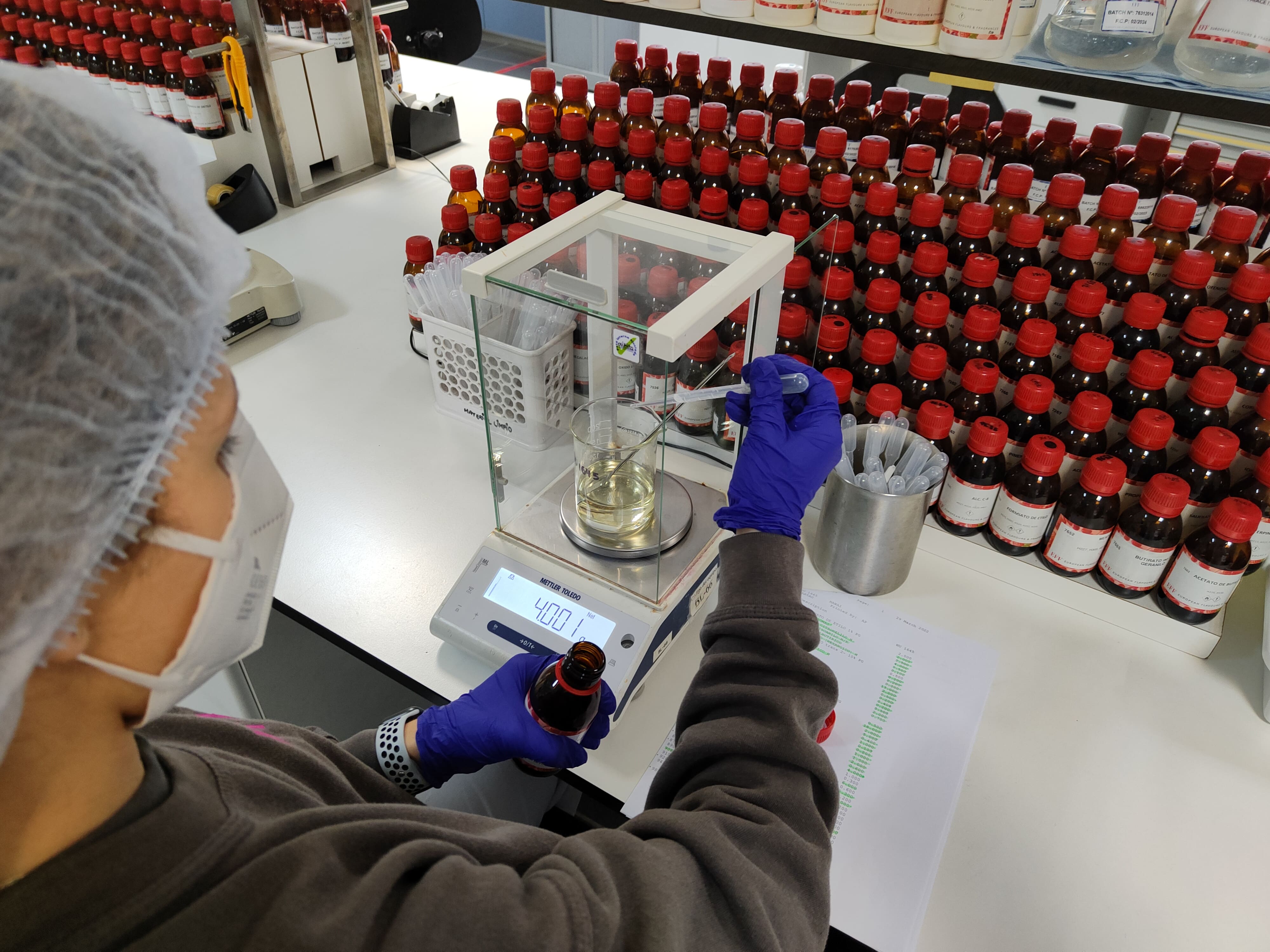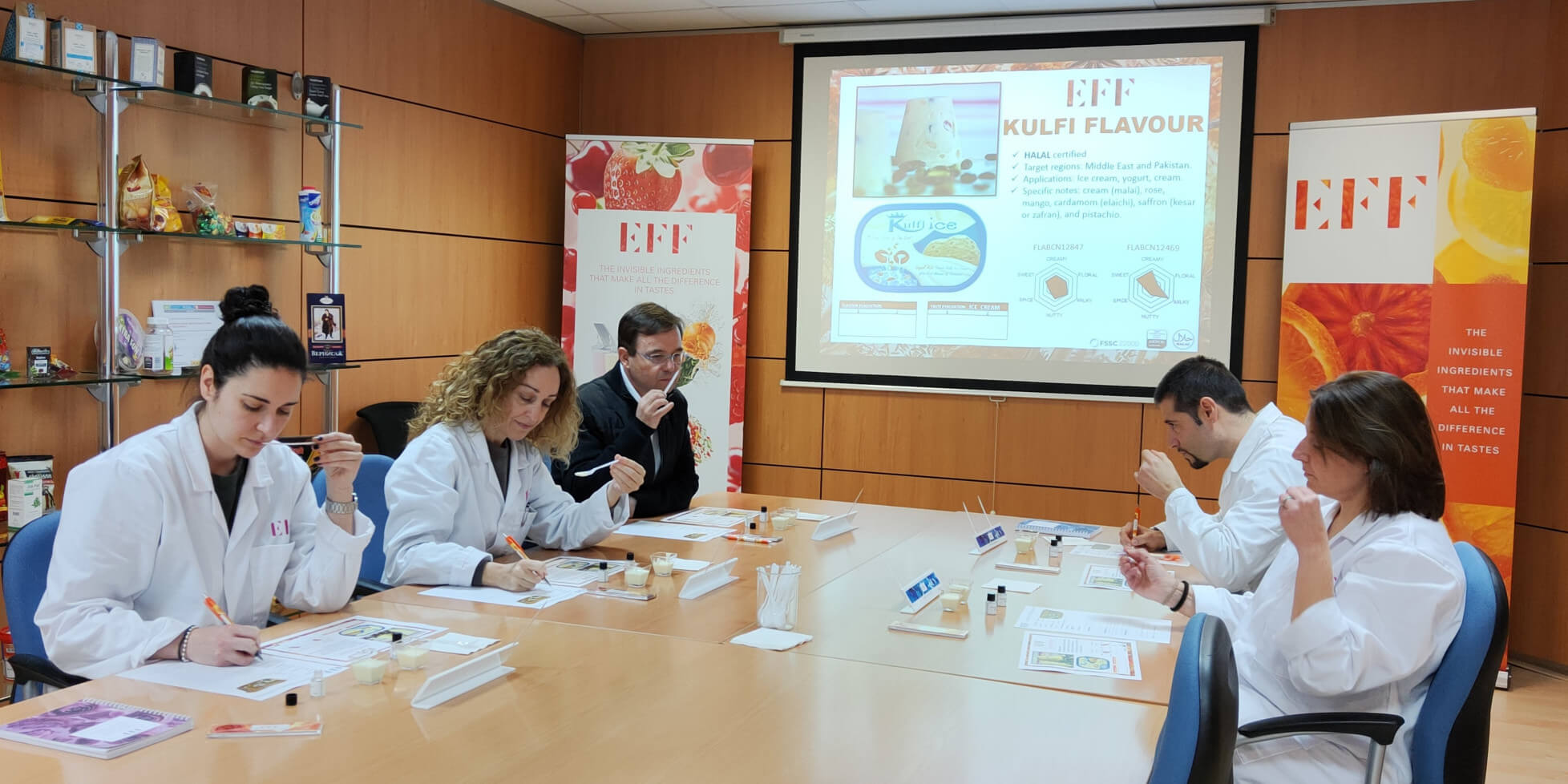
Balancing the flavours
The Spanish branch of the UK-headquartered European Flavours & Fragrances (EFF Group) houses its flavour division. Its primary focus is emerging markets and it develops hundreds of halal-certified flavourings for the food and beverage sector.
Salaam Gateway spoke with Frédéric Joubert, CEO of EFF Spain, ahead of this year’s Alimentaria exhibition in Barcelona on 4-7 April.
Salaam Gateway (SG): What is the EFF Group’s global positioning?
Frédéric Joubert: EFF Spain is the subsidiary of the British family-owned company EFF Group. The British arm is more involved in the fragrances side with production sites in the UK, Singapore and India and sales offices in Dubai and Poland. The flavour division is based in Barcelona and we have a production unit in Singapore. We design, produce and sell flavours in liquid and powder forms for the human food and beverage industry.
SG: Where are your main markets?
Joubert: The Middle East and Africa, Russia and parts of Southeast Asia. Although we have several important customers in Europe, our strategy is based on emerging markets. We are a small to medium- sized company with annual revenue of about €4 million ($4.46 million) and are targeting €8 million ($8.93 million) turnover for the flavours division in the next four years. Our competitors are both multi-national companies and local producers, but we also focus on different markets – confectionery, dairy, bakery and snacks – and look for the main medium to large local companies.
We defend our European-made quality product based on a quality assurance system of which halal is an integrated part. However, we are more flexible than bigger companies as we can develop customised products with minimum order quantities from 5kg batches up to 2,500kg.
SG: How significant are exports to EFF Spain?
Joubert: Our business model focuses on exports as 90% of sales. In Spain there are more than 15 key players in the flavour side so securing more of that cake is difficult and time-consuming. It is better to invest in emerging markets with local salespeople and develop these markets with the support of EFF’s affiliates in Dubai, India, Poland and Singapore.
SG: When did EFF become halal-certified?
Joubert: EFF has been halal-certified for over 20 years. Halal certification is not just a certificate. When the flavourists think about a new development and write down the formula with the molecule names, they think about halal requirements. They know the next step is sourcing the right materials. Even if we don’t sell this flavour to a Muslim country, if this flavour works, Muslim consumers will ask for it. Hence, considering halal requirements at the initial development stage leads to a win-win situation and speeds up the process.
SG: How does this work?
Joubert: Our flavourists develop the formula mindful that they cannot use any raw materials with pork, alcohol or other haram (non-permitted) ingredients. If we have to work with alcohol, it differs between markets from Algeria to Indonesia, Iran or Malaysia. The latter countries require 0%, whereas Algeria allows 0.5% alcohol by volume as it is allowed to be the same alcohol content as natural vinegar.
After designing the flavour and formula, we source the raw material. The purchasing department contacts suppliers and distributors and works with the regulatory department to ensure raw materials are halal certified. It takes time, but is part of our strategy and a cost we assume. When we review all the raw material documentation, everything must have a halal certificate.
SG: Does that require certifying plenty of ingredients for each formula?
Joubert: A flavour formula can have more than 50 to 70 ingredients and molecules. This means we have to review each ingredient and request halal certificates from suppliers related to the material quality to certify the flavour as halal.
SG: EFF is certified in Spain, but what about the halal certification requirements of the countries to which you export? Have you had issues?
Joubert: Exporting to emerging markets is not easy. If I want to sell in the Philippines or Nigeria or Russia, we need halal certification. Which one? This is the constraint. In terms of halal certifications, there are numerous halal certification bodies and, depending on the country, you need one certification or another. We work with Halal Food & Quality as they understand our concerns and look for solutions.
SG: Is the lack of a universal standard a particular challenge?
Joubert: Imagine – you are thousands of kilometres from your customer and he says we need halal certification. We have a Singapore distributor who imports our flavours using the halal MUIS certificate specific to the city-state. However, his end customer is in Indonesia where the halal MUI certificate is required, meaning we need both certifications. This example is simply one restraint for European companies exporting to halal markets, as you must have a good understanding of different accreditation in different countries.
SG: How many flavours do you produce?
Joubert: We have a rotation of around 700 flavours and repeated flavours. Annually we send out more than 4,500 samples referring to our current flavours in our product portfolios and the new creations from our library. We have 300 to 400 products halal certified with the majority for food, mainly sweet applications, dairy, confectionery and bakery.
SG: How do flavours vary by market?
Joubert: Every region looks for the same flavours, but with a national flair. In biscuits and bakery goods, there is always demand for vanilla and creamy flavours, but the profile and notes are different in Indonesia from Kuwait or Turkey. This makes our work highly complex. To be in the market, you have to travel extensively or ask customers to send products to have the right knowledge of the local taste.
The barrier for our flavourists is when they must develop a new vanilla flavour for a specific market and have to make an effort to empathise with the local taste profile. Their palates are attuned to European tastes, but because it is difficult to imagine the taste in Indonesia or Turkey, our distributors or customers sometimes send us a parcel of finished products.
We have a working session within the research and development team to taste the finished product from the country we target as this helps us better understand local tastes to adapt and create new flavours specific to this market
SG: Can you give some examples of how flavours differ?
Joubert: We developed a kulfi flavour for Dubai, as kulfi ice-cream is popular in Pakistan and South Asia. To develop the flavour here, we asked a Pakistani friend if he knew of any shop in Barcelona where we could buy kulfi ice-cream to taste it. This friend brought us an ice-cream from a small grocery and we tried matching the flavour.
A few years ago a Russian ice-cream company wanted a new flavour profile. They stayed with us for three days as we prepared more than 100 ice-creams with different profiles. There were some with mushrooms, rosemary and jasmine – totally different as they wanted to elevate the taste of a new combination of flavours. If you present a flavour they already know, it makes no sense. Sometimes you have to be creative and innovative.
I visited a customer in the Algerian beverage sector – that country is a huge market for carbonated drinks – and presented a honey and ginger flavour. He said, “We eat honey here; we don’t drink it”. You have to be proactive, but also understand what your customers can eat and drink. They didn’t accept the combination, so we removed the honey, as they liked the ginger flavour. The end result was a mix of lemon and ginger.

An EFF technician working on a new flavouring (Courtesy: EFF).
SG: Do you think demand will grow in Europe for halal-certified flavours?
Joubert: Years ago we thought halal was only for Muslim consumers and only Islamic countries, but that has changed. A new trend in flavour development is to integrate a halal focus. France has a large Muslim community originating from Algeria, Morocco and Tunisia, and Germany from Turkey. There are also 2 million Muslims living in Spain, while during summer, Muslims living in northern Europe cross Spain to visit their families in North Africa.
During that journey they are also consumers who request halal products. Non-Muslim consumers are also interested in halal products as they feel they are safer or healthier. The concept of halal food products for non-Muslim consumers is something we have to take into account and, in the future, this will be a new market segment.
SG: How was EFF impacted by the COVID-19 pandemic?
Joubert: The main impact was logistical. Our flavours can be sent by air or sea freight, but air freight costs increased significantly during that time. In some countries, Uganda and the Philippines as examples, the cost increase was so high that customers said they could no longer afford it.
We also suffered from lockdowns. The ports in Malaysia and the Philippines were closed for instance and the pandemic affected us more in Asia Pacific than in other regions. We have resumed operations with the Middle East and Africa, but Southeast Asia is still difficult.
SG: You will be speaking at the III International Halal Congress of Alimentaria. What are you expecting from Alimentaria this year?
Joubert: New companies, product developments and processes to manufacture new foods are my expectations – as well as the growing developments within digitalisation. I want to see how the food industry can adapt to these new trends. There are new consumer segments like the millennials, and a sub-division to Muslim millennials, who want new sensory experiences. It is not the same tastes with which they grew up or their parents experienced. They want new flavours and that makes our job more interesting as we attempt to combine flavours. It can be crazy, but we have to offer something new.
© SalaamGateway.com 2022. All Rights Reserved
